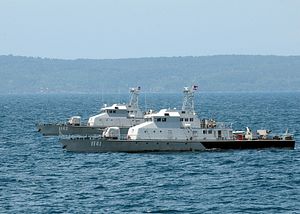On July 8, Defense Minister Tea Banh left Cambodia with a large, high-powered delegation of 23 high-ranking military and security officials for a five-day trip to China. While both sides have insisted that the visit is a routine one, recent events, as well as the specifics of the visit, have led it to get significantly more attention than it otherwise would.
Cambodian and Chinese officials have been bending over backwards to describe the visit as a routine one. On the Cambodian side, a military spokesman told reporters it was “just an annual exchange visit,” and Defense Minister Banh himself told The Cambodia Daily that the visit was “nothing big.” On the Chinese side, reports said very little about the agenda except that it was designed to “further enhance bilateral ties and cooperation,” with Banh meeting military leaders and visiting some key institutions of China’s Ministry of Defense.
For some, this is hard to believe. According to Defense Ministry spokesman Chhum Socheat, the 23-member delegation for the so-called “friendship-boosting” trip includes the commanders of all three branches of the Royal Cambodian Armed Forces – the army, navy and air force – as well as the National Military Police Commander. Despite Banh’s denial, such a large and high-powered delegation makes the visit look “big” regardless of what it is actually designed to do and what else is going on at the time.
Regardless of the nature of the visit, recent events as well as other specifics have led it to receive greater attention than it otherwise would. The trip comes just days after violent border clashes between Cambodia and Vietnam at the end of June in disputed territory reignited concerns over sovereignty and territorial integrity. The Cambodian opposition accused the ruling Cambodian People’s Party (CPP), headed by Prime Minister Hun Sen, of using maps drawn by Vietnam to assess the country’s borders with Hanoi – a serious charge given Vietnam’s invasion and occupation of Cambodia in 1979. As an indicator of how significant the issue is, Hun Sen wrote to United Nations Secretary General Ban Ki-moon on July 6 to ask for a map prepared by colonial ruler France to sort out this problem once and for all. Vietnamese and Cambodian officials have also been meeting in Phnom Penh this week to talk about border issues, though no resolution has been reached at the time of writing.
Given these developments, Cambodia’s dispatch of a high-powered delegation to China has understandably turned heads. China is the largest donor of military aid to Cambodia, and as I have noted previously, their defense ties have strengthened over the past few years (See: “China Just Gave Cambodia’s Military a Boost”). Beijing’s ties with Vietnam have also been strained of late, leading Hanoi to move relatively closer to Washington within the ‘U.S.-China-Vietnam triangle’ as Alexander Vuving recently put it. Indeed, to some, the optics of a Cambodian defense delegation in China while Vietnam’s communist party secretary paid a historic, much-awaited visit in the United States this week has been striking even it were merely coincidental (See: “US and Vietnam Should Boost Defense, Economic Ties, Says Communist Party Leader“).
Though Cambodia-Vietnam border issue has not been directly mentioned by Cambodian or Chinese officials on the trip so far – one should not expect it to be – more indirect references to the issue are there for those who are looking for them. For instance, following Defense Minister Banh’s meeting with his Chinese counterpart Chang Wanquan as well as Xu Qiliang, the two sides vowed to improve their military ties and “continue supporting each other on major issues regarding core interests.” The phrase “core interests” has been excessively and contentiously used to describe China’s changing position on the South China Sea – which Cambodia largely supports. But the point here is the emphasis on the support for the core interests of “each other.” While one can argue about what constitutes Cambodia’s core national interests, sovereignty and territorial integrity – which factors significantly into its ongoing border issues with Vietnam – is definitely one of them.
The trip lasts till July 12, and the jury is still out on the visit and what it really means. But with everything else that has been going on, it is not surprising that a big Cambodian defense delegation landing in China has led observers to speculate.

































